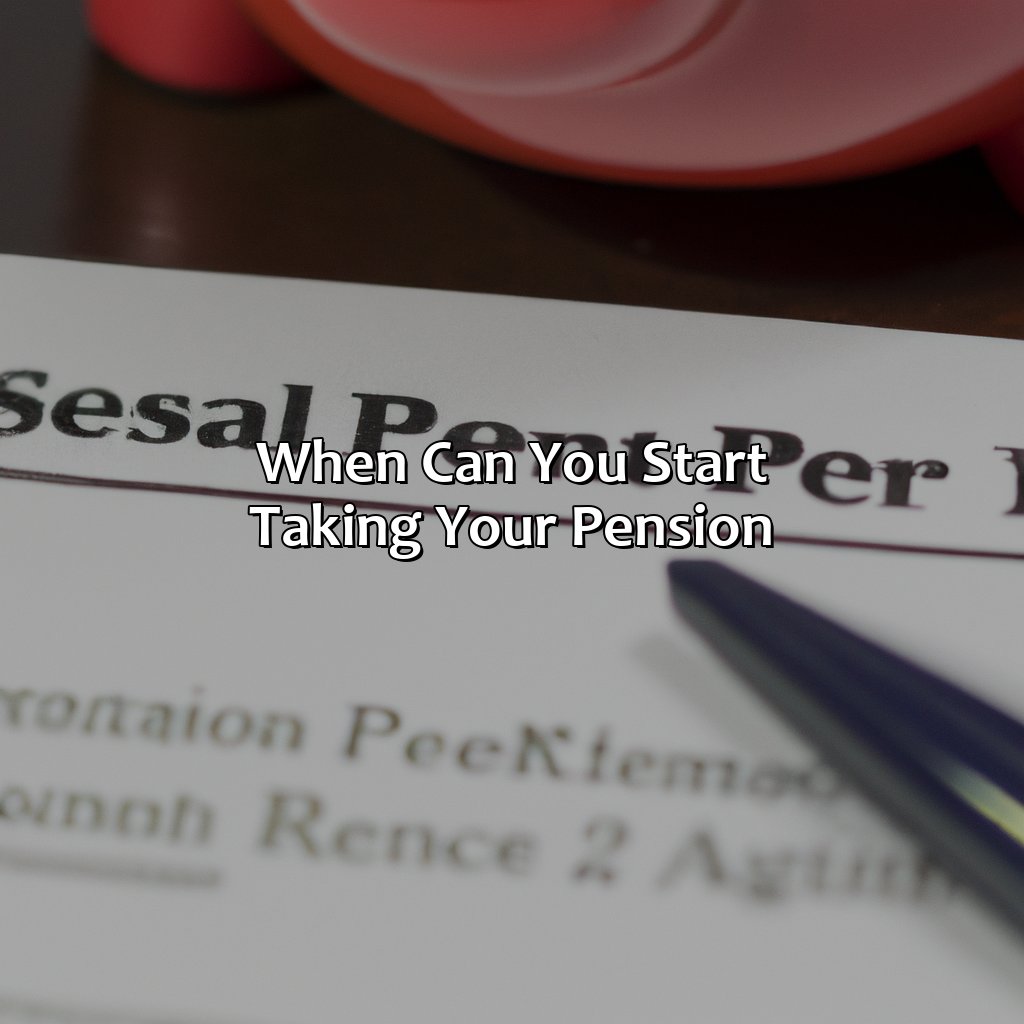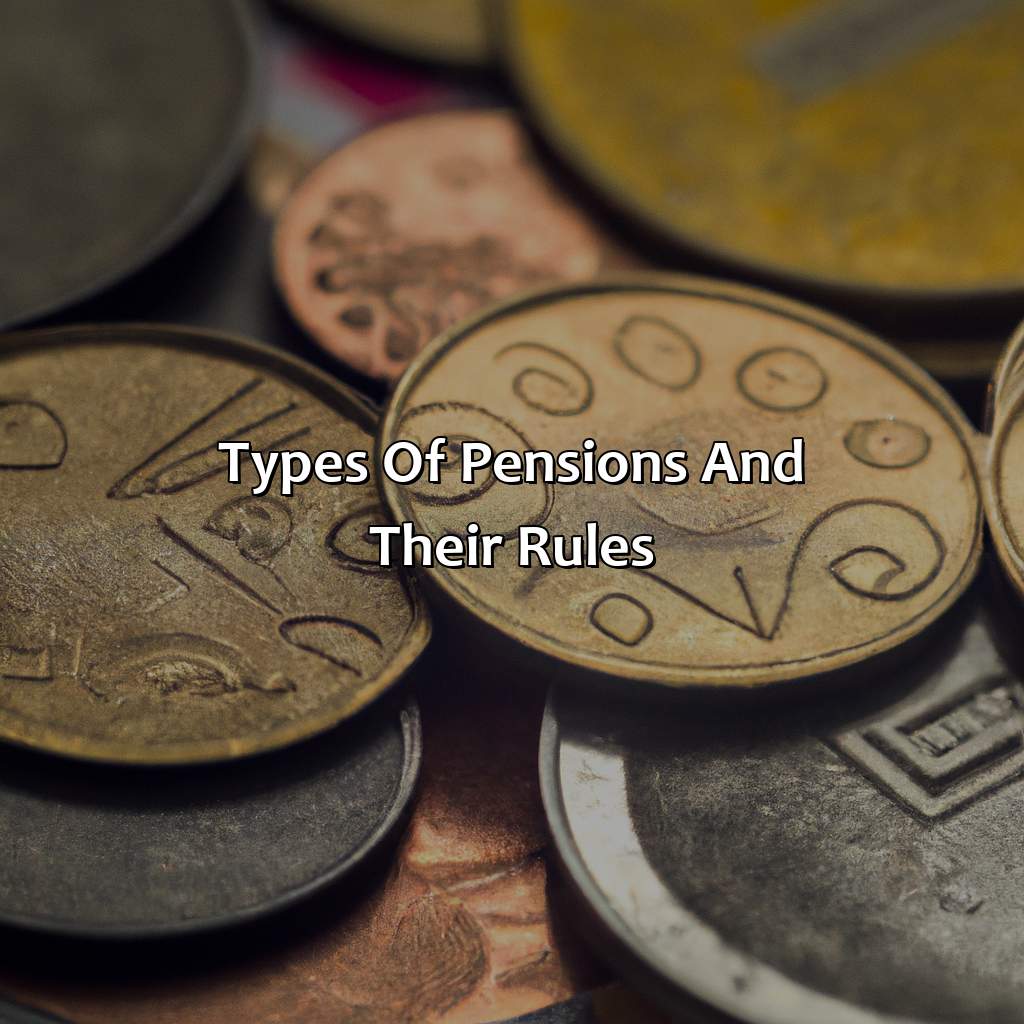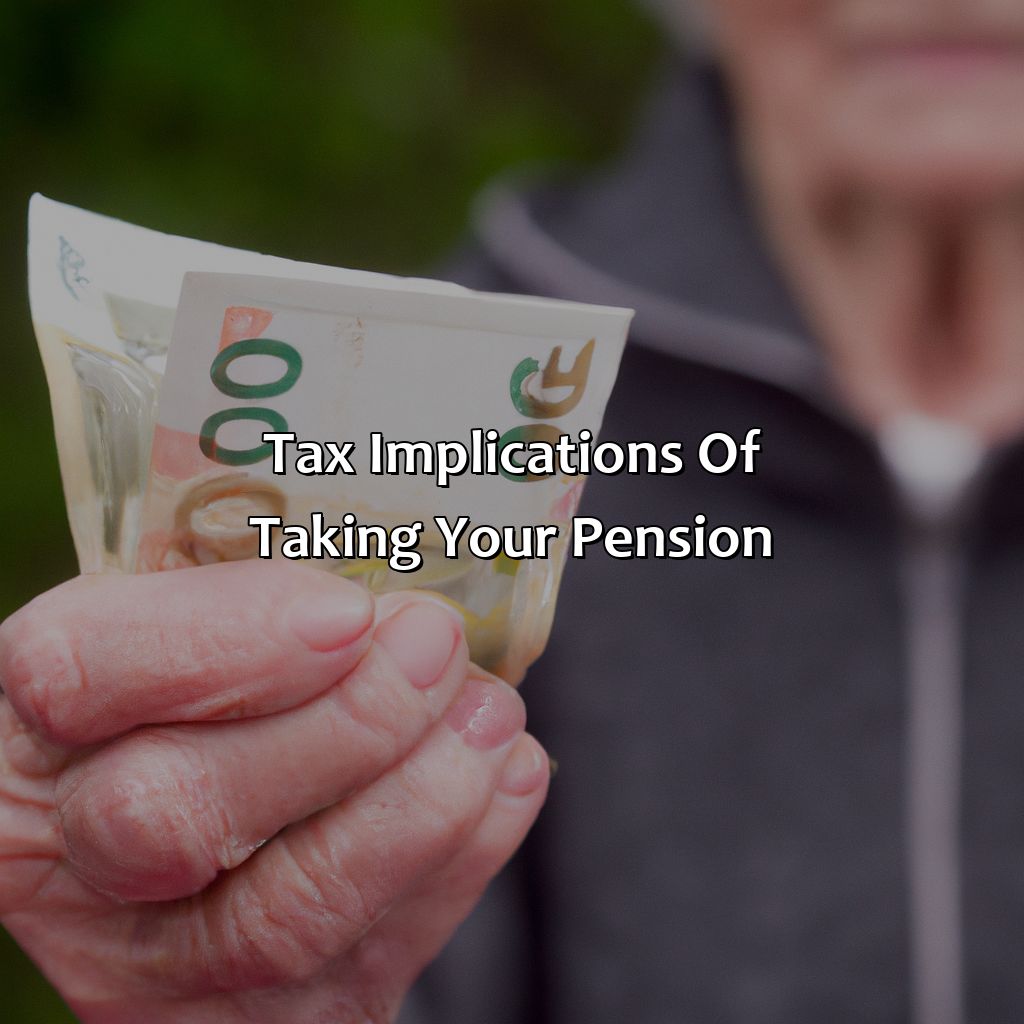Do You Have To Take Your Pension When You Retire?
Key Takeaway:
- When it comes to taking your pension, there is no one-size-fits-all answer. The age at which you can start taking your pension, as well as the rules for when and how you can access it, varies depending on the type of pension you have.
- Two main types of pensions are defined benefit pensions and defined contribution pensions, and they have different rules for accessing funds. With a defined benefit pension, you will receive a guaranteed payout based on factors such as your salary and length of service. With a defined contribution pension, your payout depends on the performance of your investments.
- There are several options for taking your pension, including taking it all as a lump sum, buying an annuity, or leaving it invested. Each option comes with its own advantages and disadvantages, and it is important to consider factors such as your financial situation, goals for retirement, and tax implications before making a decision.
Are you wondering if you have to take your pension when you retire? You don’t have to accept your pension at retirement – there are a number of options available to you. In this article, you’ll discover what choices you have and the implications of each.
When can you start taking your pension?
Starting Your Pension when You Retire
Your pension journey may be different depending on the type of pension you have. Knowing when to start taking your pension can be crucial in making the most of your retirement money. Generally, you can start taking your pension once you reach the minimum age set by your pension scheme.
There are also certain factors that can affect when you should take your pension, such as your financial situation, health, and plans for retirement. Some people choose to take their pension as soon as they are eligible, while others opt to defer it to receive a higher payout later.
There may also be options to take your pension in a lump sum or as annuity payments. It’s important to understand the pros and cons of each option and weigh them against your financial goals.
Pro Tip: Consider consulting a financial advisor to help you make informed decisions about your pension and retirement plans.

Image credits: retiregenz.com by Joel Duncun
Types of pensions and their rules
You must comprehend the various sorts of pensions and their regulations in retirement. To do so, it’s essential to be familiar with defined benefit pensions and defined contribution pensions. These two kinds of pension plans can deliver different advantages and have diverse principles for accessing savings.

Image credits: retiregenz.com by David Jones
Defined Benefit Pension
Pensions where your retirement benefits are based on a formula involving factors such as your salary history and tenure are called a particularity prosperous variation of Retirement Benefit. In simple terms, defined benefit pensions will provide you with a specified amount of income for the rest of your life once you reach retirement age. Employers or plan trustees fully fund these pension funds, and the concepts underlying defined benefit plans are typically complex due to actuarial calculations regarding investment return assumptions, mortality rates, and liabilities.
It is vital to note that those in defined benefit plans do not have control over their investment accounts, but they only need to manage attaining the required years of service. This type of pension is subject to regulation under federal law known as ERISA.
Pro Tip: Consider getting professional assistance before choosing between different types of pension plans available.
I guess you could say a defined contribution pension is like a box of chocolates – you never know what you’re going to get.
Defined Contribution Pension
In this type of pension, the amount you receive during retirement is based on your contributions and investments made. The employer may also contribute, but the risk and responsibility are yours. You may have control over where to invest your money, but these investments carry a certain amount of risk.
As you near retirement age, you will need to choose whether to take your pension as a lump sum or as income. If you choose to take it as income, you can either buy an annuity or keep the funds invested and take money out as needed. There may be tax implications for both options.
It’s essential to consider various scenarios when deciding what to do with your defined contribution pension. Factors such as current financial situation, expected future expenses, and life expectancy must be taken into account before deciding the best course of action.
According to a recent study by Fidelity Investments, the average balance in a defined contribution plan is $104,000.
Why settle for a boring old pension plan when you can spice things up with some pension options?
Options for taking your pension
Retirement options? Examine ‘Options for taking your pension’! Three solutions: a lump sum, an annuity or leave it invested. Each provides distinct ways to manage your pension fund. Pros and cons come with each.

Image credits: retiregenz.com by David Arnold
Taking it all as a lump sum
When you retire, there is an option to receive your pension all at once, in what is known as a ‘lump sum.’ This option may seem attractive as it provides immediate access to funds. However, it also involves paying higher taxes upfront and may not be the best decision for everyone.
A lump sum pension payment can result in a higher tax bill due to the size of the payment. Furthermore, depending on the amount, this option could push you into a higher tax bracket, further increasing tax bills. It’s essential to consider all taxes applicable before choosing this option.
You should also think about how much you need and whether receiving everything at once will leave you with enough money to support your retirement. If you have significant expenses to cover or little other income sources available, taking a lump sum might not be ideal for ensuring your financial security.
Overall, there are pros and cons of taking your pension as a lump sum. An alternative would be to use drawdown options that allow for ongoing access to funds and more control over income levels– potential solutions that offer flexibility while maintaining financial stability.
Buying an annuity is like choosing a life partner- you’ve got to make sure you’re comfortable with the terms and you’ll be happy with the payout in the long run.
Buying an annuity
Purchasing an income for life is a viable option for those seeking retirement security. This guarantees monthly distributions until death, relieving one of investment risk. An annuity’s value depends on age when purchased, gender, interest rates and present economic conditions.
Choosing the right annuity requires examining options carefully. Considerate analysis of various providers’ policies, fees and performance is necessary. Multiple types like fixed term or variable annuities exist. Selecting the correct annuity should be based on one’s budgetary and lifestyle needs.
Moreover, assessing an annuity can help determine it fits your financial plan to assure you receive guaranteed long-term income. As with any retirement investment vehicle, review tax implications of purchasing an annuity in advance.
One real-life example illustrates this point – a client bought an annuity with a guaranteed eight percent rebate from the provider over five years. Unfortunately, they didn’t consult a financial advisor first and lost thousands in potential gains by selecting this sub-optimal option when alternative products were available in their situation.
Leaving your pension invested may be the ultimate FOMO – fear of missing out on potential gains or fear of running out of money later, choose your poison.
Leaving it invested
After retirement, have you considered the option of retaining your pension funds invested? This can provide potential long-term growth and allow for flexibility in withdrawing payments. By keeping funds invested, individuals can benefit from market fluctuations and potentially see higher returns.
However, leaving funds invested involves a level of risk and requires ongoing management to monitor investments. It may also depend on individual circumstances such as age, health, and financial objectives.
It’s important to note that different options exist for investing pensions post-retirement, including Income Drawdown, Annuities or Uncrystallized Funds Pension Lump Sum (UFPLS). Consulting with an independent financial advisor can help decide what suits you best.
Keeping your pension invested has its advantages but understanding the implications is crucial. A story illustrates this: An individual who retained his pension funds invested had a steady income until the 2008 market crash which wiped off a significant proportion of his savings. He did not anticipate this eventuality and had no back-up plan when it happened.
Even the IRS can’t resist taking a piece of the retirement pie – beware of the tax implications when taking your pension.
Tax implications of taking your pension
When withdrawing your pension, you must consider the tax implications of your decision. Your choice can impact the amount of tax you pay both now and in the future. You may have several options, such as taking a lump sum payment, an annuity, or drawing down income as you need it. Your chosen method will affect how much tax you pay on those withdrawals. Additionally, the timing and size of payouts can influence your tax bracket. Hence, planning and navigating the complex tax rules surrounding your pension withdrawals can save you significant amounts of money.
A careful analysis of your pension options and tax obligations can maximize total after-tax lifetime income from your pension. You should consider both your current and future tax situation when choosing a pension withdrawal strategy. One option is to keep your money in your pension until you need it, enabling it to grow tax-free. Another is to spread your tax payments systematically over several years. Moreover, you must understand the lifetime allowance and annual allowance taxes. The former taxes any pension saved beyond a specified amount, while the latter taxes the income earned from a pension.
According to the Money Advice Service, you can withdraw cash tax-free from your pension in installments. These installments should not surpass your personal tax-free allowance. If you take the whole pension pot at once, you may pay over 40% tax. Thus, it is crucial to consider all the tax implications before taking your pension.
True Fact: According to government data, up to 46,000 savers could face “huge” tax bills of more than £13,500 each if they exceed a Lifetime Allowance tax threshold set by HM Revenue and Customs.

Image credits: retiregenz.com by Harry Duncun
Factors to consider before making a decision
Retirees have several factors to deliberate before deciding to take their pension. Factors to consider include their health, lifestyle, financial needs, and the type of pension they have. The pension plan may offer more to those who wait longer to receive payouts. Retirees must also consider the tax implications and whether their pension will provide enough funds to sustain their expected lifestyle in retirement. Pensions can be complex, and it’s advisable to seek professional advice before making decisions.
It’s crucial to understand the long-term impact of the pension options available. Stay on top of any changes that could alter pension payout amounts or eligibility requirements, such as inflation rates and changing government regulations. Additionally, retirees must plan for different scenarios that may occur during their retirement, like unexpected expenses or lifestyle changes.
Retired persons can benefit from being informed about the history of pensions to make informed decisions. Pensions began in the 17th century when the Royal Navy allowed workers to receive half-pay while on shore leave to encourage them to stay in the force. Since then, private pensions have gained popularity in many industries. Today, there are various pension plans, including defined benefit plans and defined contribution plans. Retirees must understand their pension plans’ specifics to make informed decisions about their payouts, tax implications, and other considerations.

Image credits: retiregenz.com by Joel Woodhock
Five Facts About Taking Your Pension When You Retire:
- ✅ You are not required to take your pension when you retire. (Source: The Balance)
- ✅ Some pension plans have deadlines for when you must start taking distributions, or face penalties. (Source: Investopedia)
- ✅ You may have the option to take your pension as a lump sum or as regular payments over time. (Source: AARP)
- ✅ Your lifespan, retirement goals, and financial situation are important factors to consider when deciding when to take your pension. (Source: Forbes)
- ✅ There may be tax implications when taking your pension, so it’s important to consult with a financial advisor. (Source: U.S. News & World Report)
FAQs about Do You Have To Take Your Pension When You Retire?
Do you have to take your pension when you retire?
No, you do not have to take your pension when you retire. You have the option of leaving your pension invested with the pension fund or transferring it to a different provider. However, taking your pension provides you with a regular income throughout your retirement.
What happens if I choose not to take my pension?
If you choose not to take your pension, it will remain invested with the pension fund. Your pension will continue to grow, but you will not receive any regular income from it until you decide to start taking your pension.
Can I delay taking my pension?
Yes, you can delay taking your pension. The age at which you can start taking your pension may depend on the specific pension scheme you are a member of. The longer you delay taking your pension, the more it will be worth when you do eventually start taking it.
What are the benefits of taking my pension when I retire?
Taking your pension when you retire provides you with a regular income throughout your retirement. You will have peace of mind knowing that you will be financially secure during your retirement years. Additionally, some pension schemes offer tax benefits for taking your pension.
What are the drawbacks of taking my pension when I retire?
If you take your pension when you retire, you will no longer have access to the lump sum that you would receive if you transfer your pension to another provider. Additionally, you may be subject to taxes and fees.


